Become an authority
How to Use Search Engine Optimisation to Get More Accounting Clients
Search Engine Optimisation (SEO) is the art of creating content and optimising your existing pages, so your website ranks on Google.
Your customers use the search engine to get answers to their questions. If your website ranks for the right terms, people will click on the page when looking for answers. You can use this opportunity to sell your service.
While the idea is simple, competition can be intense, and established websites are more likely to rank for terms with high-volume. Nonetheless, there are still plenty of opportunities for accounting firms that are new to SEO to rank. You just need to put in place a consistent, targeted strategy.
In this article, we will show you how accountants can rank their website on Google. We will use the example of tax accounting, but the general tactics are valid no matter your speciality.
Keywords are the terms people search for on Google. Things like “best accountant in London” when looking for an accountant in their area.
The first part of an SEO strategy is finding keywords to target. The best ones will have lots of users searching for them but few other websites creating content on the subject. The terms will also relate to the service you provide.
There are tools you can use to find good keywords. At Kalium Marketing, we use a program called Ahrefs.
To find keywords using the program, sign up and head over to the Keyword Explorer feature. Then, enter your accounting speciality into the search bar and choose the country you want Ahrefs to show data for.
Your accounting speciality acts as your primary keyword. The software will use this information to show you related terms you can also target.

The search results page provides basic information about how to rank for the term. As you can see, according to the Keyword Difficulty rating, Ahrefs estimates that it will be relatively easy for a website to rank for “tax accounting.” A good sign.
The page also shows that this keyword has around 150 people searching for it every month.
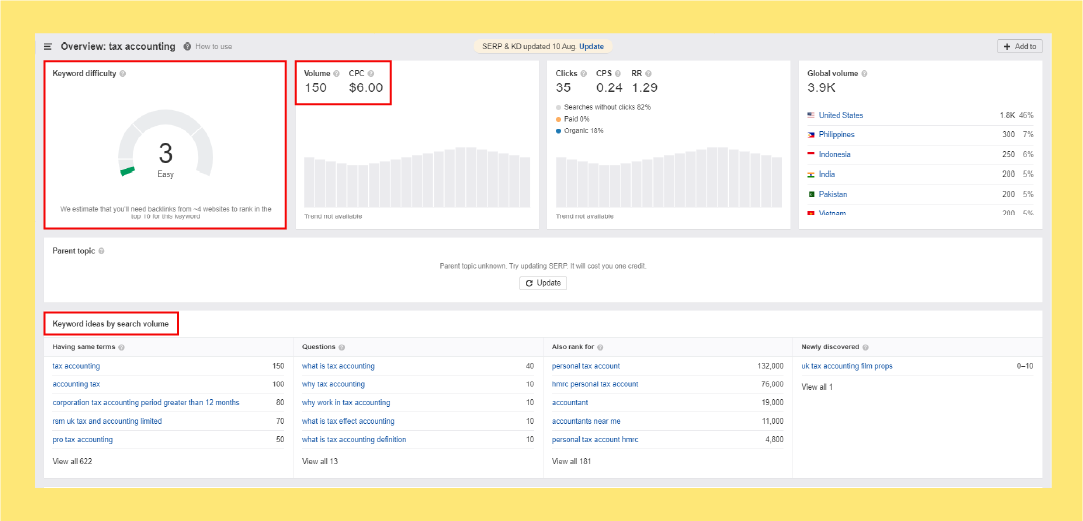
To find other terms, click on “view all” in the “keyword ideas” section. Here you will see information about these keywords, such as the volume of monthly searches and the keyword difficulty.
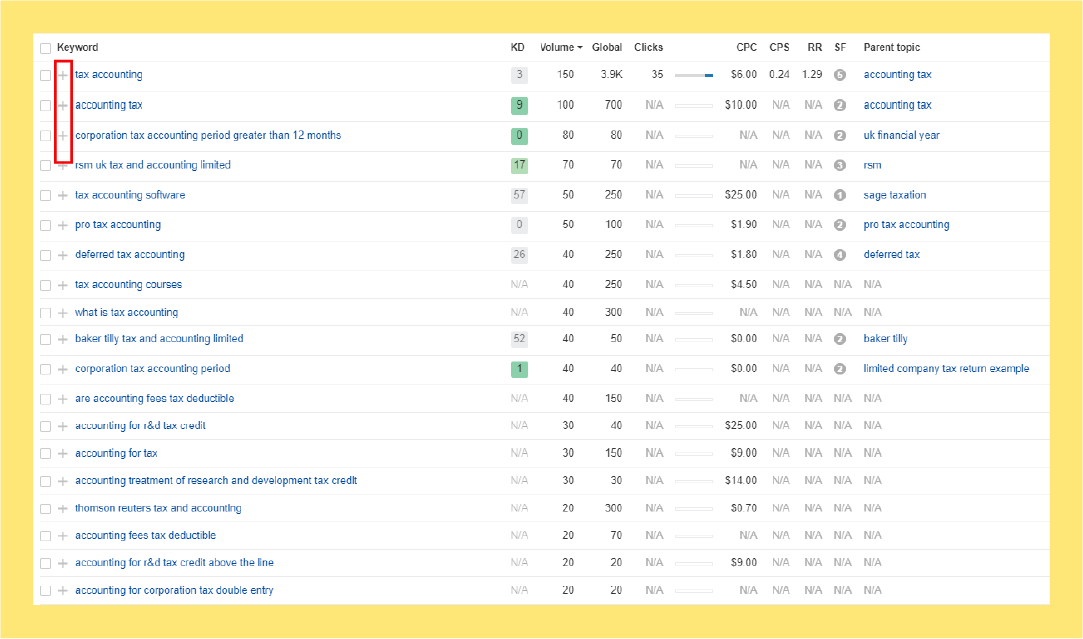
There are 47 pages of keywords relating to the term “tax accounting.” This is too many to rank for, so we need to narrow down our list. You can add priority keywords to a list by clicking the plus sign next to the entry.
When choosing keywords, you should also consider the intent of the person searching.
For example, the term “tax accounting courses UK” is less relevant, although it has high monthly volume and low keyword difficulty, users searching for this term are searching for accounting courses, not the services of an accountant.
You can then export your selected keywords to a spreadsheet. Here are some we felt were promising.

They all have a relatively high volume, low keyword difficulty, and are relevant.
Now we have a list of keywords, we need to look at the best way to get our website to show up when people search for them. Google considers a large variety of factors when deciding which pages to show at the top of the search results. The most important factors are:
Your website receives a backlink when another site links to a piece of your content. The theory is that people link to useful content, so the more referrals a page or website has, the better the content should be.
Google considers the number of backlinks a site has, how relevant the referring page is to the content, and how authoritative the site giving the backlink is. A backlink from the Financial Times, for example, has significantly more ranking power for an accounting website than one from a cooking blog.
Ahrefs provides much insight into the backlink profile of sites that rank on Google. The below image shows the top-ranking pages for the term “property tax accountant.” You can see that the site ranked number one has 1,006 backlinks from 42 domains.
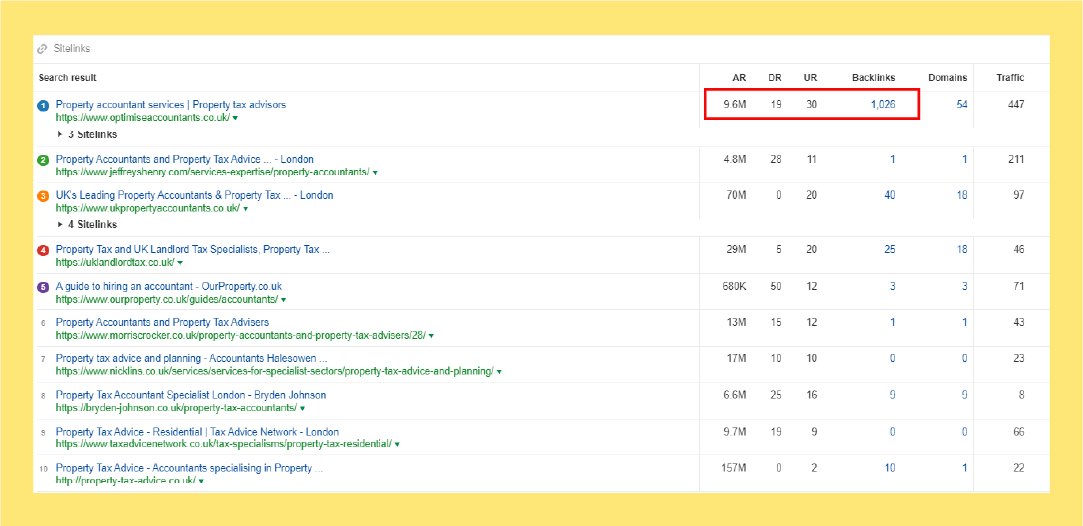
The key things to look for on this page are the:
To rank for the keyword, your website’s AR, DR, and UR should be similar to the sites on the first page. This isn’t set in stone, though, as Google takes plenty of factors into account when ranking content.
Google always tries to ensure its search results show content that matches what the searcher wants to find.
While we can guess what a user may be looking for, our idea of user intent may differ to Google’s. As Google controls the algorithm, you should make sure your content matches what Google thinks a useful page is.
The best way to find out what Google considers a good match is to look at the pages that are already ranking for your target term.
You should consider:
Looking at the results page for “property tax accountant,” you can see that most of the ranking pages are either web domains for property accountants or pages for general accountants that also offer property tax as a service. The pages are typically short and contain information about the service. For example, this one below from Jeffreys Henry LLP.
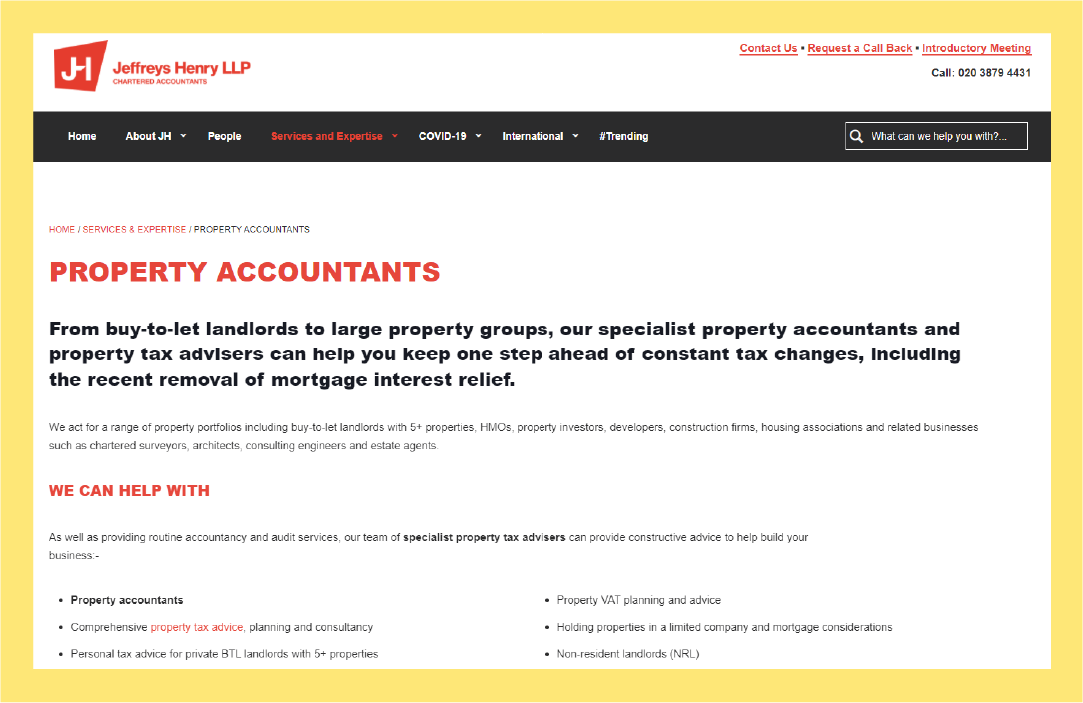
To rank for this keyword, your best bet would be to create a page on your website that has details about your property tax accounting service and how it can help.
Including the search terms you are trying to rank for in your content helps Google define what your page is about. Accountants that want to rank for “property tax accountant” should include this and similar terms in their content.
You can put keywords in:
The key is to include the keyword enough for Google to understand what your page is about, without distracting from the readers’ experience.
Google will understand synonyms and similar phrases. For example, the Jeffreys Henry LLP page doesn’t contain the phrase “property tax accountants,” yet it still ranks for the term. This is in part because it uses the phrases “property accountants” and “property tax advisors.”
You can optimise a single piece of content for multiple search terms. The Jeffreys Henry page also ranks highly for the keywords in the image below. An accounting firm targeting “property tax accountants” may also be able to rank the same piece of content for the below terms.
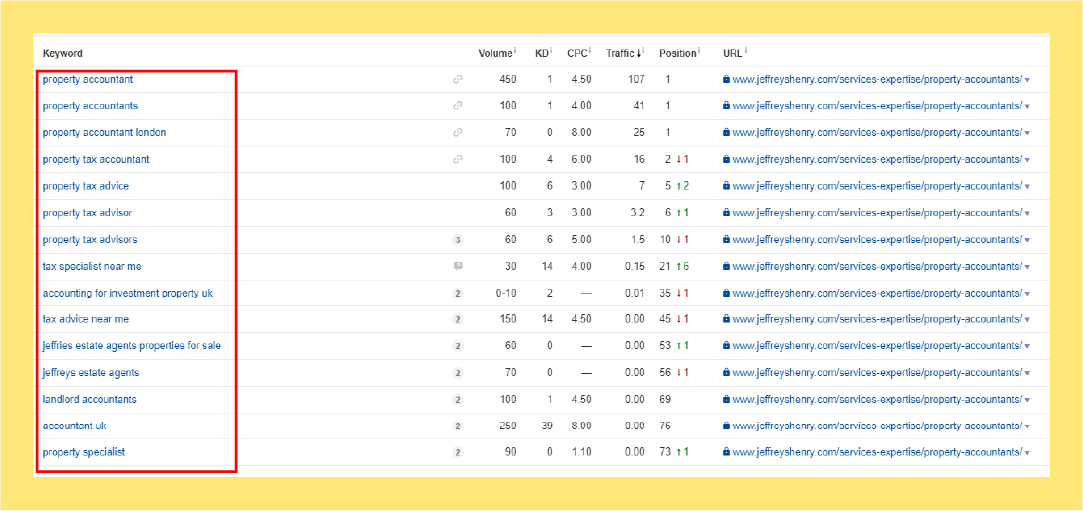
Google considers the experience of using a site when deciding which websites rank. Here are some factors that affect the site experience:
Site experience is hard to define but you can get a good idea of whether people enjoy your page through Google Analytics. If people spend a long time on the page and view other content on your website, it suggests they enjoy the site. If they bounce straight away, it could suggest there is a problem.
While the information in this article may seem quite simple, it’s important to remember that implementing an SEO strategy takes time.
You need to create high-quality, targeted content consistently for several months before you are likely to begin to rank. Once you start to gain traction, the benefits are huge as you will receive a steady stream of potential customers visiting your site.
Ready to explode
your search traffic? 🚀

Our search 🔎 campaigns
deliver real business results
UK Based Team
36 Fifth Avenue, Havant, Hampshire, England, PO9 2PL
Cape Town Team
55 Somerset Road, Green Point, Cape Town, South Africa
This is just for us to learn a little bit more about your site; it won’t take longer than a minute! ⏳
Let’s get started! 🚀🚀🚀